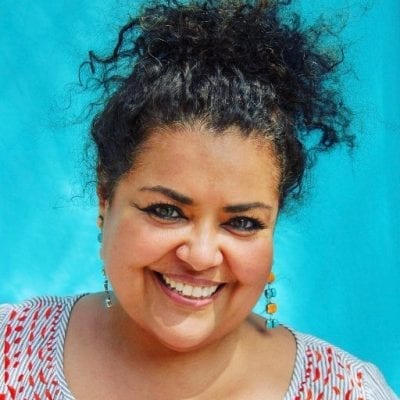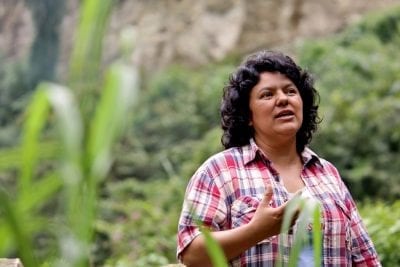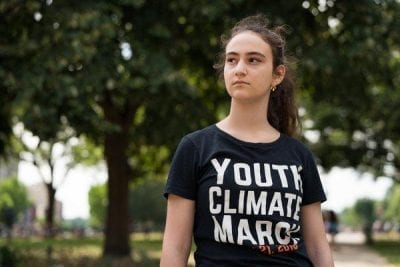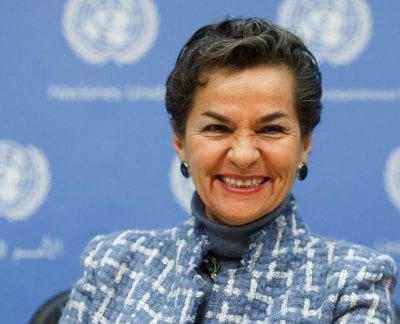By Natalie Roach
The midterm elections that took place this November have ushered in a new vanguard of representatives ready to fight for the needs of the people. These newly elected representatives have harnessed public enthusiasm for change to beat out incumbents, and are entering Congress full of ideas and energy. One of the most well-known of these newly elected representatives is Alexandria Ocasio-Cortez. A 29-year-old Latina from the Bronx, Cortez is the youngest woman ever elected to Congress. Along with a number of her colleagues, she has announced a plan called “The Green New Deal” that pushes for climate change to be prioritized in Congress. Ocasio-Cortez is just one example of the many Hispanic activists across the country and world that are fighting to protect us from environmental degradation.
In our country, Latinx people are more concerned about the environment and more willing to take action to protect it than the general population. This makes sense, since a history of environmental racism means they are one of the populations most affected by environmental hazards like particulate pollution and poor water. Despite often being excluded from the mainstream environmental movement, Latinx people have always been heavily involved in environmental activism.
In Latin America, environmentalists are fighting for their lives, literally. As the area continues to develop and those in power exploit the land and its resources, indigenous and poor people are displaced. Their way of life, their land, and their livelihoods are stolen from them, and governments do very little to protect them, if not encourage the exploitation. When people decide to organize and fight back, they are threatened or killed. A 2016 report from GlobalWitness found that two-thirds of the 185 environmentalists murdered in 2015 resided in Latin America.
UConn recognizes the importance of this reality. The USG Sustainability Subcommittee is one organization on campus that is dedicated to working towards a just and sustainable planet for all people. They are organizing a series of events this semester that make clear the importance of including Hispanic people and other diverse groups in the environmental movement. Keep an eye out for their events this semester!
We cannot possibly cover all of the passionate Hispanic activists that have dedicated their lives to environmentalism. However, we have highlighted some activists here which showcase the breadth of Hispanic people’s influence on the environmental movement.
Elizabeth Yeampierre
 Elizabeth Yeampierre is an internationally recognized pioneer in the environmental movement, intent on creating a platform for oppressed communities in the fight against climate change. A Puerto Rican attorney with indigenous and African roots, she was born and raised in New York City, and has fought on behalf of her community for her whole life. She has pioneered a model of intergenerational, multi-cultural, and community-led organizing that is award-winning and effective.
Elizabeth Yeampierre is an internationally recognized pioneer in the environmental movement, intent on creating a platform for oppressed communities in the fight against climate change. A Puerto Rican attorney with indigenous and African roots, she was born and raised in New York City, and has fought on behalf of her community for her whole life. She has pioneered a model of intergenerational, multi-cultural, and community-led organizing that is award-winning and effective.
Yeampierre is a leader in numerous organizations across the country, including the Climate Justice Alliance, a national coalition of community-based organizations focused on environmental justice, and Building Equity & Alignment for Impact, which aims to strengthen relationships between philanthropists, large environmental nonprofits, and grassroots organizations. She was one of the driving forces behind the historical People’s Climate March in 2014. She is also a leader in New York City policy. She currently serves on mayor DeBlasio’s Sustainability Advisory board, and has been instrumental in historic legislation such as the passing of New York’s first Brownfield legislation and the adoption of NYC’s Solid Waste Management Plan. On the federal level, she was the first Latina chair appointed to the EPA’s National Environmental Justice Advisory Council, and was also a member of the National Environmental Health Sciences Advisory Council. In addition to delivering inspirational speeches around the world, Yeampierre works as the Executive Director of UPROSE, a grassroots organization that focuses on sustainability and resiliency in Brooklyn, NY.
Berta Caceres


Berta Caceres was a fearless environmental leader in her country of Honduras, one of the most dangerous places to be an environmentalist in the world. While still in college, she co-founded the Council of Popular and Indigenous Organizations of Honduras (COPINH), and continued to lead the group for the rest of her life. The COPINH led a variety of important grassroots campaigns including protesting illegal logging, plantation owners, and US military presence on indigenous land. Caceres supported a wide range of social and indigenous issues including feminism and LGBT rights. As indigenous rights and human rights are inextricably linked with the environment, she became known as a prominent environmentalist. In 2015 she won the Goldman Environmental Prize for a campaign that was successful in pressuring the world’s largest dam builder to end a project on the Gualcarque River that would have “jeopardized the water resources and livelihood” of the surrounding land and people. However, her work to protect the people of Honduras eventually led to her death. In 2016, she was assassinated in her home by armed intruders. Fellow activists say one of Berta’s favorite expressions was “they are afraid of us because we are not afraid of them.”
 Jamie Margolin
Jamie Margolin
Youth activist Jamie Margolin is one of the 21 youth who have filed a lawsuit against the federal government alleging that the action it has taken that has led to climate change is depriving the next generation of life, liberty, and property, and has failed to protect essential public trust resources. The case made it to the US District Court this fall.
Margolin, however, is not waiting around for a decision to be reached. While this case is proceeding, she has created a national climate movement. She is the founder of Zero Hour, a diverse youth-led movement dedicated to concrete action to end climate change. In July of 2018, Zero Hour held a three day event in DC consisting of a day to lobby legislators, an arts festival, and the Youth Climate March itself. Sister marches happened in tandem across the nation and world. Margolin’s movement is focused on concrete action, not just rhetoric – they have a science-backed platform stemming from the lawsuit, and their march included a specific set of action items. They are also successfully intersectional; their platform fully recognizes that solving social issues is vital to fighting climate change, and having women of color at the helm brings a diversity to this movement that has led to its success.
Vanessa Hauc
Vanessa Hauc is an Emmy award-winning trilingual reporter who has used her platform to educate Spanish-speakers and the larger world about environmental issues. She started her career in Bogota, Colombia in 1993, and in 1999 moved to LA. She graduated from the University of Nevada with majors in Communication and Journalism, while working at nearby TV stations. In 2002 Hauc joined the Telemundo network as reporter and co-presenter of “Al Rojo Vivo con Maria Celeste,” and has risen up the ranks to her current position as a correspondent for Noticiero Telemundo. Telemundo is one of the largest providers of Spanish-language content in the country and has a global reach, providing programming in more than 100 countries.
Hauc has taken advantage of this global audience to spread awareness of environmental issues by creating her own segment “Alerta Verde” (Green Alert), to educate the public about the importance of protecting the environment. After much success, Telemundo made Alerta Verde its own company, and is now at the forefront of environmental news coverage.
Hauc has also been on the frontlines of environmental crises throughout her career, reporting on the ground from disasters. She covered Hurricane Katrina, earthquakes across the world, including Chile, Japan, and Haiti, and the Chilean miners’ rescue. She has also dedicated her time to travelling the United States challenging legislators on anti-immigration policies, has received a Master’s degree in Economy and International Politics from the University of Miami, and studied French Culture and Languages at the University of Aix in Provence, France.
 Christiana Figueres
Christiana Figueres
One of the world’s greatest accomplishments in the last decade was the Paris Climate Agreement, signed by 195 countries in 2015. This historical agreement was largely due to our next environmentalist, Christina Figueres. Figueres has a master’s degree in social anthropology and is a diplomat for Costa Rica. She became the Executive Secretary of the United Nations Framework Convention on Climate Change (UNFCCC) in 2010 and assumed responsibility for the annual international climate change negotiations. She was determined to bring the world to a consensus and implement a regulatory framework for carbon emissions that everyone could commit to. She successfully directed a series of annual negotiations across the world that culminated in the Paris 2015 Conference of the Parties (COP21), at which the Paris Climate Agreement was signed.
Christina is not satisfied with just the Paris Climate Agreement. She continues to push the world towards increasing climate protection. She is currently organizing Mission 2020, a global initiative to have world carbon emissions begin decreasing by 2020.